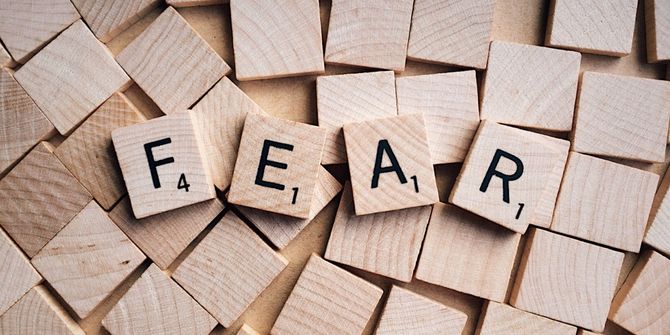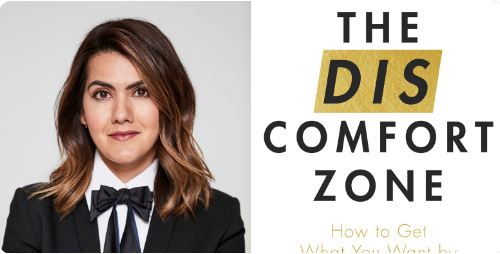Moving beyond your comfort zone can be scary. Global Master’s in Management student Alice Brazil-Burns reveals what she learned about overcoming her fears at Farrah Storr’s Women in Business lecture, where the inspiring Cosmopolitan editor explained her advice for succeeding in adversity.

As the middle-child born and raised in Manchester, Farrah Storr realised she needed to step out of her comfort zone to forge her own path. She presented her inspiring talk at the Women in Business Lecture Series at LSE, chaired by Department of Management fellow Dr Rebecca Campbell. Editor-in-Chief of Cosmopolitan magazine, whose achievements include being named in 2018 as one of the powerful BAME leaders in the country by The Guardian and being launch editor of Women’s Health magazine, the most successful women’s magazine launch of the millennium, Farrah has more than most to say about reaching beyond your comfort zone.
A regular spokesperson on women’s issues, diversity and careers, Farrah’s frank and hilarious book The Discomfort Zone is available to awaken those who are are “sleepwalking into a world made for comfort” as “the world needs people who are built for battle.” In both the book and talk, Farrah draws upon examples from her own life – as well as those of high achievers from various fields – to show how success can only be achieved if we are willing to step outside our comfort zone. Farrah’s storytelling has allowed me to contextualise and understand my own journey of growth.
Farrah asked us in the audience to first close our eyes and recall a time we felt afraid in our childhood. The fear of falling, the fear of a loud noise, the fear of judgement and the fear of surprise were all popular choices. As a child, my life was peaceful, kind, and full of adventure, led by parents who encouraged me to explore as many new experiences as I was interested in. Evoking the notion of fear was tricky.

The similarity between Farrah and I, however, was that we both reached a point in our journeys where protection and nurturing had left us with little identity. This realisation came at a point where I did recall a real fear: when my mum was diagnosed with cancer. Having lost her own mum two months previous, the fear of another loss so quickly was an incredible wake-up call. Due to this personal circumstance, I was forced to evolve outside my own comfort zone and face up to how limited and finite our time really is.
Realising this, I decided to get the most out of life. As I was carrying this hardship I stepped outside my comfort zone. I was offered an amazing opportunity: to Project Manage in an Outreach department at an internationally renowned theatre. The fear I initially felt from being given such responsibility at such a prestigious place became excitement for building from scratch.
The fact that I was both trusted and yet felt like an outsider forced me to act. I hadn’t even gained a place at university, yet I chose to throw myself outside my comfort zone and find myself. In this new place, I was nurtured by an incredible artistic director, playwrights, actors, producers and new peers. My new professional team supported my curiosity both creatively and intellectually, but it was up to me to get into University.
The fulfilment I found in my work gave energy to move forward through obstacles and the challenges I was facing, both personally and professionally. I knew these were vital to the growth of the work, but they also tested my resilience and agility. The people around me inspired me to step further and despite encountering doubters I was offered a place at Warwick University. Three years later I was a first class graduate from the leading department, where I had also been a receipt of numerous scholarships and having undertaken research projects, had worked in New York, was now an award-winning producer from more projects and printed nationwide in the press as a Next Generation Leader in the Arts.
Although I wouldn’t wish it on anybody, my initial hardship ultimately built the robust foundations upon which my growth was built. The passion and focus I had required building momentum in my actions as I did not have time to consider any fear (of death, of being too big, of failure, of being wrong). This mirrored Farrah’s perception of restraints as an advantage, helping her make smarter and quicker decisions. This mindset carried with Farrah as the newly-appointed Editor at Cosmo got it to number one. “When there is no time be scared”, Farrah said,” there is no other choice but to be bold and sometimes audacious.”
I don’t want to sweep past these moments outside my own comfort zone like a montage – it was hard work and struggle. It’s important to recognise that the experiences and opportunities outweighed the obstacles and grind. Farrah also mentioned in this in her talk. She referenced serial entrepreneur Marcia Kilgore, explaining that determination should not be “wedded to the idea of success – it’s a teetering moment, what you have to know is most of life is grind but grind is good because it feels like you are moving somewhere” and “you know when a job is a challenge or when it is slog.”
Finally, there’s overcoming failure or the fear of failure. Farrah identified that failures are opportunities, which, although tough to swallow, “reward me with great truths about myself” as “all success has come from those moment of discomfort.” Furthermore, “failure often occurs because you are going to uncharted territory with no information because you’ve taken a risk.” Farrah called this is also only half of failure – good failure is “going back and asking why to find out exactly it’s going back and ask why” to “take the shame out of failure.”
Learning about myself by pushing myself outside my comfort zone without the time to consider failure, allowed me discover and learn about myself, which has is imperative to building my stamina. Failure is a great way to get information that no one else has, added Farrah, “you have to be brave enough if you have the right motives.” Understanding that we are built for growth is helping me face the new challenges of being a post-grad student LSE and beyond. The wisdom gained from stepping out of my comfort zone allows me to identify and control being drawn to kind, authentic and enthusiastic people. It does continue to teach me, also, that as I learn (how to learn) the stories of people who move me towards my growth have become my own stories.
Farrah’s Top 3 Tips:
- The person you are at 20 is not the same person you are at 40. Define your values and never sway from them. Your values will keep you as the person you set out to be.
- Favourite mantra: This too shall pass
- Don’t use the F-word. Don’t identify fear as fear – see it as a challenge. Human beings are designed to stand up to fear and challenges.
You can listen to the full podcast of Farrah Storr’s LSE lecture on the LSE podcast here.





